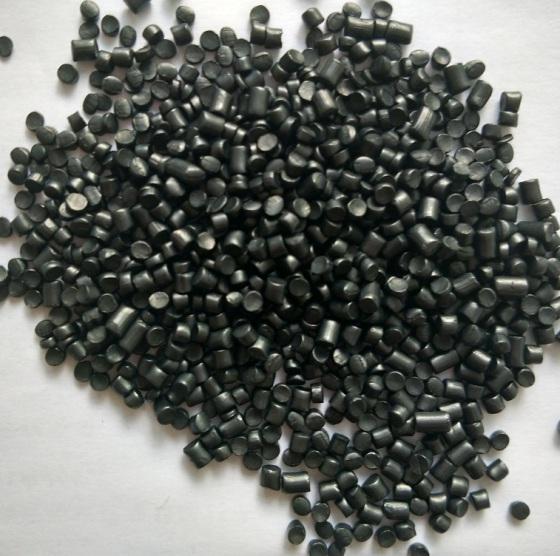The selection principles of various masterbatch carbon black
1. Carbon black selection for plastics
Plastic coloring generally uses the pigment carbon black. Pigment carbon black can be further divided into high pigment carbon black, medium pigment carbon black, and low pigment carbon black based on their coloring ability. Plastic products generally choose the type of carbon black according to the requirements of the product's blackness, using pigment carbon black with fine particle size and high blackness to produce ABS and high-grade PVC synthetic leather for cars with high blackness requirements. However, PE garbage bags, wires, pipes and other products only require a medium level of blackness, and can choose pigment carbon black with coarser particle size and medium blackness.
The particle size and structure of carbon black are different, and their dispersibility is vastly different. The finer the particle size, the more contact surfaces there are, and the stronger the cohesion between them. It can be seen that the criteria for selecting carbon black with good dispersibility should be large particle size and high structure.
When you want to get a shiny black plastic product, you should choose low structured carbon black with a small particle size. This is because when carbon black is colored, the blackness is mainly based on the absorption of light. Therefore, at a specific concentration of carbon black, the smaller the particle size, the higher the light absorption, the weaker the light reflection, and the higher the blackness. To achieve satisfactory coloring effect, special attention should be paid to the dispersibility of carbon black. Only by addressing the dispersion of carbon black can a higher coloring power be achieved.
Carbon black has high light absorption, which can effectively prevent plastic from oxidative degradation caused by sunlight exposure. Generally speaking, selecting 2.5% carbon black with a certain fineness for coloring polyolefins can achieve better anti-aging effect.

2. Selection of carbon black for chemical fibers
Nowadays, most carbon black anti-static and conductive fibers are prepared by melt spinning method, while a portion are obtained through surface post-treatment. Among them, the melt spinning process has high requirements for the quality of carbon black, and the function of carbon black can be evaluated through the following indicators.
① Filterability. In the process of fiber production, the service life of filter materials can be used to characterize. In industrial production, two types of filtration systems are primarily used: the central filtration system, which is a two-layer filtration system with two interchangeable filters and a metal filter inside the container; The second is the filtration of spinning components, usually components filled with metal powder, installed in front of the spinneret. If the carbon black particles are large or the particle size distribution is uneven, it is easy to block the central filter and spinning component filter. In this way, not only will it increase the frequency of replacing and cleaning center filters and spinning component filters, but it will also increase the production costs of filter cleaning, screen replacement, manual labor, shutdown, waste, etc. More importantly, frequent continuous production will cause a decrease in production capacity and product quality instability.
② Laxity. The dispersing function of carbon black refers to the difficulty of a certain carbon black being dampened by the color masterbatch carrier resin and dispersing the agglomerates. This function primarily depends on the strength of the agglomerate, which is the energy required to disperse the agglomerate into a single aggregate. Choosing appropriate coupling agents or special surface treatment methods is the key to advancing the dispersing function of carbon black.
Article source: Taishan conductive mica particles
-
04-11
Taishan conductive PP masterbatch: How to use defoaming masterbatch?
Defoaming masterbatch is suitable for enterprises that use PE and PP recycled plastics for product production. The trace amount of moisture contained in raw materials has a very serious impact on the
-
11-13
Characteristics and uses of conductive masterbatch plastics
Characteristics and uses of conductive masterbatch plastics1、 Characteristics of conductive masterbatch plastics:① Most plastics are lightweight, chemically stable, and will not rust;② Good impact res
-
10-13
What is PP talc powder masterbatch
What is the masterbatch of PP talc powder?PP talc powder masterbatch is a plastic modified filler, mainly composed of talc powder, which is a particle mixed with polymers or other carriers. It is main
-
08-09
Taishan Conductive Cloud Masterbatch Manufacturer Tells You Why to Use Conductive and Anti static Engineering Plastics
1. The fundamental physical properties of static electricity are:(1) Attracting or excluding;(2) There is a potential difference with the earth;(3) Discharge current will occur.These three characteris

